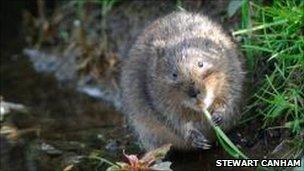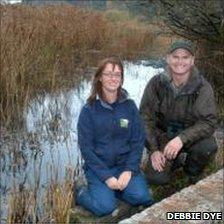Dorset rivers and streams to be restored
- Published

Dorset's rivers and streams are home to a wide range of wildlife
A major restoration project is to be carried out along Dorset's rivers and waterways over the next five years.
Dorset Wildlife Trust will be cleaning up chalk streams and building new wetland habitats in the floodplains.
The Dorset Wild Rivers partnership has been funded by Wessex Water and will work with land owners, farmers, fishing groups and environmental organisations.
It is hoped the project will benefit fish and invertebrates by reducing the run-off from agricultural land.
It will mainly focus on the Frome and Piddle Valleys and the chalk stream tributaries of the Stour, Allen, Tarrant and North Winterborne.
Habitats under threat
Sarah Williams, project co-ordinator, said chalk rivers were renowned for their crystal-clear waters and supported a huge range of aquatic insects while providing spawning sites for trout and salmon and food for predators such as kingfishers, otters and the native white-clawed crayfish.

The project is being supported by film-maker Simon King
She said the river valleys contained important wetlands, including wet woodlands, flower-rich fens and wet grasslands, home to wildfowl and wading birds such as lapwing and snipe.
Ms Williams said the project was "an opportunity to work in partnership with the community to improve the health of wildlife and landscape across a wide area".
"Over the centuries, chalk rivers have been meddled with by man and, with the help of fishing groups and farmers, we want to improve these sections so as to join up the existing stretches of good river habitat."
Dave Jones, environmental scientist at Wessex Water, said: "We recognise the threat that wetland habitats are under and hope our funding will help reverse the decline in wildlife which depends on this unique habitat."
The project is being supported by wildlife film-maker Simon King from the BBC Autumnwatch programme.
He said: "To look into the crystal clear waters of a chalk stream is to catch a glimpse of a whole world of wildlife dependent on this supreme English habitat.
"With Dorset Wild Rivers, these sparkling ribbons of life and their associated wetlands are being cherished and restored for now and the future."
- Published20 October 2010